It didn't take long for investors to divert their attention from the U.S. election results to economic data and corporate news. And despite ongoing downward pressure on drug companies most indexes continued their positive trajectories. Investors in the UK and Australia barely blinked after interest rate increases by their respective central banks. Rather the news had already been priced into the markets. However, investors in Japan were uneasy given the spate of lower-than-expected economic data there and are worried about the projected next move by the Bank of Japan. On the week, all indexes followed here with the exception of the Nikkei and Topix were up.
Global Stock Market Recap

Europe and the UK
Despite downward pressure on drug companies following the U.S. election, the FTSE, CAC and DAX all registered gains last week. The FTSE continued to flirt with five-plus-year highs while the CAC and DAX toyed with six-year highs reached earlier in the week. Offsetting declining drug stock prices were increases in commodity and oil company shares. Stocks in Europe retreated from a six-year high reached earlier last week on concern a Democrat-controlled U.S. Congress will pass legislation that hurts drug company earnings. Higher oil prices and weaker-than-expected consumer confidence figures rekindled growth worries for the U.S. On the downside in economic news, French economic growth unexpectedly ground to a halt in the third quarter, casting doubt on the strength of the European expansion and damping speculation about further interest rate increases next year.

Bank of England rate at five-year high
As expected, the Bank of England increased its key interest rate by 25 basis points to 5 percent. In their statement, the Monetary Policy Committee said that faster economic growth risked driving inflation further above its 2 percent inflation target. Further, they said there was little spare capacity in the economy. Inflation was up 2.4 percent in September and is anticipated to jump 2.7 percent in October, reflecting tuition fee increases. The UK has grown at the fastest pace in two years as consumers spent and house prices surged again. This was the second rate increase this year. The Bank will publish new forecasts on Wednesday that could point to another 25-basis-point increase in 2007. The British economy, which has expanded for 57 consecutive quarters, managed to avoid the recessions that tripped up the U.S., Germany, France and Italy during that period.

Asia/Pacific
Japanese stocks were down last week, thanks in part to an ongoing stream of disappointing economic data and saber rattling from the Bank of Japan about possible interest rate increases. But the weak data could stop the BoJ from proceeding with their monetary policy normalization plan. The graph below typifies why investors are uncertain and glum. Machine orders unexpectedly sank in September leaving analysts and investors fretting about growth in Japan. It appears as though companies have refrained from expanding their investments in capital goods because they are concerned about the outlook for the U.S. and its domestic economy. Although growth cooled in most countries during the third quarter (the UK was the exception), analysts worry that Japan's gross domestic product will be anemic, and possibly negative. They won't have long to wait - the first estimate will be released on Tuesday (local time and Monday night on the U.S. East Coast).

On the week, Asian/Pacific stocks were up in Australia, South Korea, Hong Kong and Singapore. The Hang Seng once again reached new heights before receding on Friday. It was down Friday as Lenovo had its biggest drop in two years after the company's gross margins missed some analysts' estimates. The All Ordinaries was up despite higher interest rates from the Reserve Bank of Australia on climbing prices for oil and other commodities, which would benefit producers there.

Bank of China Ltd. and China Petroleum & Chemical Corp. (also known as Sinopec) will be added to the Hang Seng Index on December 4th. The announcement was made after a quarterly review of the stock index by its compiler, HSI Services Ltd. The number of constituents will rise to 36 from 34. No deletions were announced. The addition reflects the Chinese companies' growing presence on Hong Kong's stock market. The number of Hang Seng members will be gradually increased to 38 to include H shares, more mainland China companies. HSI Services determines constituents based on criteria such as market value and trading volume. The changes to the components would prompt funds that mirror the stock benchmark, such as the $3.4 billion Tracker Fund of Hong Kong, to buy the stocks that are added to the index.
RBA increases rates once again
As expected, the Reserve Bank of Australia increased its benchmark interest rate to 6.25 percent - the highest in almost six years. It was the Bank's third increase in 2006 and the first since Governor Glenn Stevens took office in September. Inflation has been over the RBA's inflation target range of 2 to 3 percent. Third quarter CPI was up 3.9 percent on the year, after climbing 4 percent in the previous quarter. The jobless rate is now at a 30-year low and gasoline costs have soared and have contributed to inflation.

Currencies
The euro and yen jumped against the U.S. dollar as traders sold the dollar amid worries about possible central bank reserve diversification. People's Bank of China's Governor Zhou Xiaochuan said that China had a clear plan to diversify its reserves and is looking at various instruments to achieve that objective. Traders reacted quickly, as they assumed that Zhou referred to currency diversification. China holds around $1 trillion in foreign currency reserves and traders worry that any move by China to shift out of dollars could force the dollar precipitously lower. Zhou, however, gave no indication that such currency diversification was being considered. But the dollar dropped to a ten-week low against the euro. China is thought to hold about 70 percent of its reserves in dollars, and the remarks sparked speculation that the PBoC was looking to trim its dollar holdings in favor of the euro and the yen. The dollar slid against all 16 of the most-actively traded currencies

Indicator scoreboard
EMU - September retail sales were down 0.6 percent and up 1.4 percent when compared with last year. The monthly result reverses August's 0.5 percent gain. The decline stemmed from very weak German retail sales that plunged 1.7 percent. Although food, drinks and tobacco sales were up on the month, the increase was overwhelmed by the drop in non-food sales.

September producer price index was down 0.5 percent but up 4.6 percent when compared with the same month a year ago. Lower energy prices exerted downward pressure on the index. They were down 2.5 percent on the month. Excluding energy, the PPI inched up 0.1 percent and was up 3.6 percent on the year.

Germany - September real seasonally adjusted manufacturing orders were down 2.5 percent but were up 9.6 percent when compared with the same month a year ago. Domestic orders were up 1.5 percent and 7.1 percent on the year. Foreign orders sank 6.2 percent but were up 4.6 percent on the year. Producer goods orders were up 0.4 percent while capital goods orders dropped by 5 percent. Consumer durable goods orders also slipped by 0.5 percent.

September industrial output was down 0.3 percent but up 6.1 percent when compared with the same month a year ago. Output in all three major subsectors - manufacturing, energy and construction declined. Manufacturing output declined 0.3 percent while both producer goods and consumer goods production fell 1.0 percent. Energy production dropped 1.4 percent.

September merchandise trade surplus was €15.0 billion, up from €12.5 billion in August. Exports were up 6.6 percent while imports climbed by 3.8 percent. On the year, exports were up 14.6 percent while imports were up 17.5 percent.

France - Third quarter flash gross domestic product was unchanged on the quarter and up 1.9 percent when compared with the same quarter a year ago. As with all flash estimates, no details were available.

September merchandise trade deficit narrowed to €1.3 billion from €2.9 billion in August. Exports were up 2.3 percent while imports dropped 2.2 percent, mainly due to cheaper oil and a declining volume of imports.

September industrial production declined by 0.9 percent and was down 0.7 percent when compared with last year. Manufacturing output dropped 1 percent and was down 0.9 percent on the year. Capital goods output was up 2 percent but all other sectors declined. Autos were down 3.1 percent while agriculture declined 1.5 percent and energy was down 0.5 percent.

Britain - September industrial production was up 0.2 percent and up 0.4 percent when compared with last year. Manufacturing output edged up 0.1 percent and was up 2.1 percent on the year. Only 5 of 13 manufacturing sub-sectors were up on the month. Chemicals, man-made fibers, machinery, equipment and transport equipment were up on the month. The gains were offset by drops in electrical and optical equipment.
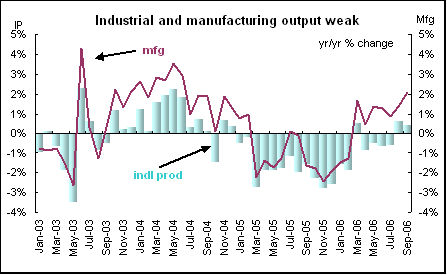
September merchandise trade deficit declined to £6.56 billion from £6.856 billion in August. The deficit including services also was down - to £4.087 billion from £4.544 billion in the previous month. Excluding oil and erratic items, the goods deficit was £5.848 billion, almost unchanged from August.
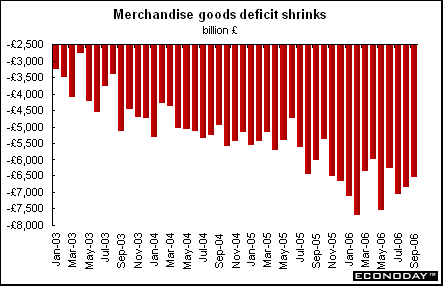
Asia
Australia - October employment sank by 32,100 jobs after gaining almost that many in September. This was the first drop in nine months. At the same time, the unemployment rate dropped to 4.6 percent from 4.8 percent in the previous month. The unemployment rate is at a 30-year low. The number of full-time jobs was down by 48,600 while part-time employment gained 16,600. The participation rate, which measures the labor force as a percentage of the population aged over 15, dropped 0.4 percentage points to 64.7 percent.
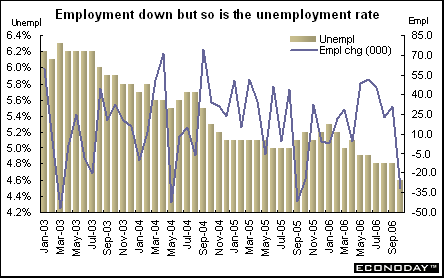
Americas
Canada - September merchandise trade surplus dropped to C$4 billion from C$4.2 billion in the previous month. Exports were down 2 percent thanks to dropping energy prices. Imports were down by 1.6 percent. The trade surplus with the U.S. dropped to C$7.3 billion from C$8.1 billion in august. Exports with the U.S. declined 4 percent primarily due to energy and automotive products. Imports from the U.S. were also down, by 1.9 percent. The deficit with the rest of the world was down.
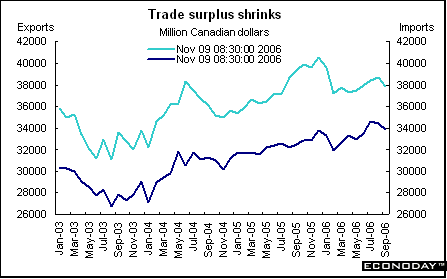
Bottom line
Most key economic data last week revolved around merchandise trade for the United States and Canada (they are always released on the same day) as well and the UK and the EMU. But the week's disappointment was Friday's French flash GDP. GDP was unchanged on the quarter in stark contrast to expectations of 0.5 percent growth. Equities were distracted mid-week by the U.S. congressional elections, but as soon as the uncertainty was over, investors resumed their focus on earnings and other economic news.
This week, flash GDP estimates will be released for the EMU, Germany and Italy in Europe while Japan will also make available its first estimate of third quarter growth. While German growth is expected to bolster the EMU, a possible GDP decline for Japan is being posited by some analysts and presumed by others. The Bank of Japan meets while the Bank of England publishes its third quarter Inflation Report.
Looking Ahead: November 13 through November 17, 2006
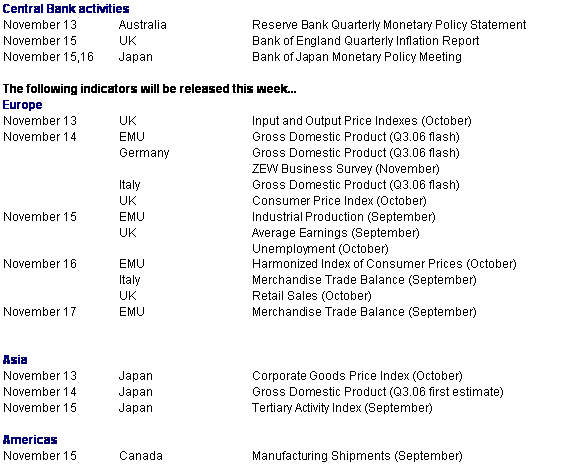
Anne D Picker is the author of International Indicators and Central Banks, which will be published by John Wiley and Sons in January 2007.

